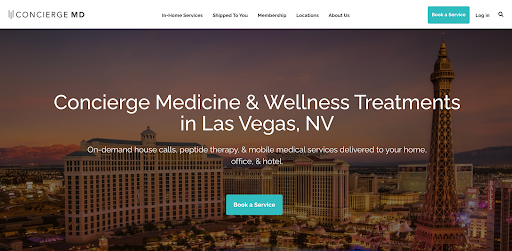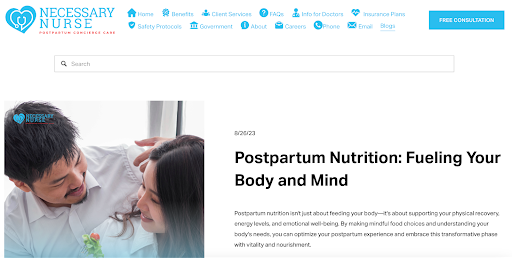As a nurse practitioner, you’ve dedicated years to honing the skills necessary to provide quality patient care. But let me guess. NP school didn’t equip you with the entrepreneurship or digital marketing knowledge needed to thrive in today’s online healthcare landscape.
You’re probably feeling overwhelmed and wondering how to stand out in a crowded digital space, attract patients, and make a decent income. The good news is you’re not alone in this dilemma, and there’s a solution.
In this guide, we’ll unveil the 10 essential strategies that’ll empower you to demonstrate your knowledge and expertise digitally, even if you’ve never had formal training in entrepreneurship or marketing. So, let’s dive in and transform your nursing expertise into a thriving online business.
The Importance of Digital Marketing for Nurse Practitioners
Digital marketing is vital for Nurse Practitioners (NPs) running their own clinics as it enhances visibility, educates patients, builds trust, and allows for precise targeting. With an effective online presence, NPs can attract and retain patients, establish credibility, and engage with their audience cost-effectively. In a competitive healthcare landscape, embracing digital marketing is crucial for NPs to stay ahead in the digital age of healthcare.
Digital marketing can:
- Offer heightened visibility, ensuring that clinics can be easily found online, thereby attracting new patients.
- Educate patients effectively through digital platforms, positioning themselves as trusted experts while fostering trust and credibility.
- Provide a cost-effective way to allocate marketing budgets efficiently to maximize ROI.
- Facilitate patient engagement and retention, enhancing loyalty and referrals through strategies like email marketing and social media.
In an ever-evolving healthcare landscape, digital marketing provides a competitive edge, helping NPs adapt to changing patient behaviors and expectations. For NPs running their own clinics, digital marketing is indispensable, offering enhanced visibility, patient education, trust, cost-efficiency, engagement, and a competitive advantage in today’s healthcare environment.
Common Challenges Nurse Practitioners Encounter in Marketing
Marketing is the driving force behind the success of NP practices in today’s healthcare landscape. While your clinical skills are undoubtedly essential, marketing is the key that unlocks the doors to growth, impact, and improved care.
Marketing for nurse practitioners can allow you to reach and connect with potential patients actively seeking healthcare services. It’s the tool that helps you stand out in a crowded healthcare arena, positioning you as the go-to NP in your community or specialty. However, nurse practitioners are facing many challenges when talking about marketing.
1. Time constraints
A common hurdle is the time constraints that often come with the demands of patient care and administrative tasks. Balancing the responsibilities of patient consultations, paperwork, and marketing efforts can be a daunting juggling act.
2. No formal marketing training
NPs might not have formal marketing training, making it challenging to craft and execute effective marketing strategies.
3. Marketing requires constant adaption
New social media platforms, algorithms, and online trends emerge frequently, demanding constant adaptation. Finding the right marketing approach that resonates with your specific target audience can also be challenging, as healthcare marketing requires a delicate balance between professionalism and relatability.
Despite these challenges, the benefits of effective marketing for NPs are indisputable. By addressing these obstacles through time management, continuous learning, and strategic planning, NPs can harness the power of marketing to elevate their practices, reach more patients, and ultimately provide better healthcare services to their communities.
10 Marketing Strategies for New Nurse Practitioners
1. Define Your Unique Selling Proposition
A unique selling proposition (USP) is a distinctive and compelling feature or advantage that sets your medical practice or healthcare service apart from competitors in the eyes of potential patients. It’s not solely about attracting new patients; it also plays a significant role in patient retention. Patients who resonate with and appreciate your practice’s unique qualities are more likely to remain loyal, resulting in improved patient retention rates.
A well-defined USP grants medical professionals a notable competitive edge. It positions them as industry leaders in their specific niche or as providers of services that others do not offer. This enhanced market position not only attracts more patients but also reinforces trust and credibility in the healthcare landscape, solidifying your practice’s value.

This Concierge Medicine‘s website messaging effectively conveys a distinctive selling point by highlighting its concierge medicine and wellness treatments, with a strong emphasis on convenience. The mention of on-demand house calls and mobile medical services delivered to your hotel room in Las Vegas demonstrates a unique commitment to bringing healthcare directly to patients, setting it apart as a convenient and personalized healthcare option for travelers in the city.
2. Build a Strong Online Presence
Building a strong online presence is essential for healthcare professionals, especially those operating independent practices, to be discoverable by patients seeking medical services online. An informative and professional online presence fosters trust and credibility, with patients often relying on practitioners’ online reputations and content for informed healthcare decisions.
This presence also serves as a platform for effective communication, extending beyond the clinic to maintain ongoing relationships with patients and provide valuable health-related content via social media, email, and other digital channels. Content marketing through blog posts, videos, and webinars establishes authority in the healthcare niche while leveraging social media to nurture patient connections, ultimately strengthening the patient-provider relationship.

Creating a full online presence involves establishing a comprehensive digital footprint for your brand, encompassing a professional website with relevant content and design, active social media profiles, and consistent listings on online directories and search engines to ensure your business is easily discoverable by your target audience. It also includes effective reputation management to monitor and enhance your online image, helping to build trust and credibility with potential customers.
3. Perform Market Research
Conducting comprehensive market research is a foundational step in crafting an effective digital marketing strategy for your healthcare practice. This strategy is invaluable because it provides you with crucial insights into your healthcare niche, competitors, and target patient demographic.
Market research in the healthcare field involves gathering data on healthcare trends, patient preferences, and competitor strategies. It allows you to identify gaps in healthcare services and make data-driven decisions for your marketing approach.
If you’re an NP specializing in cardiology, market research can reveal trends in cardiac treatments, competitor pricing strategies, and trends seen among patient populations. Armed with this knowledge, you can tailor your marketing efforts to better serve specific patient needs and differentiate yourself in a competitive healthcare market.
4. Define Your Audience
Precisely defining your target audience is a fundamental aspect of a digital marketing strategy. By creating detailed patient personas, you can customize your content and messaging to resonate with particular demographic, psychographic, and behavioral characteristics in the healthcare context.
This strategy allows you to build a more personal and meaningful connection throughout your content marketing efforts. Defining your audience is instrumental in shaping a successful digital marketing strategy. When you have a clear understanding of your target patients’ demographic details, healthcare needs, and preferences, you can create content that resonates with them on a personal level.
For instance, if your defined audience consists of elderly patients seeking geriatric care, your content strategy may focus on topics like managing chronic conditions, maintaining mobility, and improving overall well-being in later life. On the other hand, if your audience is primarily young adults interested in fitness and preventive care, your content strategy may revolve around exercise routines, nutrition tips, and disease prevention.
By tailoring your content to align with your audience’s specific healthcare concerns and interests, you can provide valuable information, establish trust, and drive patient engagement, ultimately contributing to the success of your healthcare marketing efforts.

A persona in the context of digital marketing is a fictional representation of their ideal patient or client. It encompasses demographic information, healthcare needs, online behavior, and preferences. Creating one can be immensely valuable as it enables a tailored marketing approach.
By understanding the unique needs and concerns of different patient segments, digital marketing efforts can be customized to provide relevant content, address specific healthcare issues, and engage potential patients effectively. This approach ensures that the marketing message resonates with the target audience, leading to increased engagement, trust, and, ultimately, patient conversions.
5. Create Your Brand
Defining a brand involves identifying your practice’s core mission, values, and unique qualities as a healthcare professional. It requires creating a visual identity with elements like a logo, color palette, and brand voice that reflect your practice’s personality and resonate with your target audience. Consistency in messaging, patient interactions, and online presence is crucial to establishing and maintaining a strong and recognizable brand in the competitive healthcare industry.
Establishing your brand as a healthcare professional is not just about creating a logo or choosing a color scheme; it’s about defining your practice’s identity and values, building trust, attracting the right patients, and ensuring a consistent and professional patient experience. In the competitive healthcare industry, a strong brand can make all the difference in the success and longevity of your practice.
CVS Pharmacy is an exemplary model of effective branding in the healthcare and retail industry. With its distinct red and white logo, CVS has successfully crafted a memorable and recognizable visual identity. Overall, CVS’s branding efforts showcase how consistent and purposeful brand identity can create a lasting and positive impression in the minds of consumers.

6. Share Valuable Content
Creating and sharing valuable content is a fundamental and highly effective digital marketing strategy. It involves producing content that educates and informs your audience while positioning you as an authoritative and trustworthy source in your field.
This engagement with high-quality content encourages interaction and builds a community around your brand. Additionally, search engines favor valuable content, leading to better SEO rankings and increased organic traffic.

For example, this blog does a great job of focusing on postpartum women. By truly understanding the needs of their audience, they can address a specific and relevant healthcare niche, demonstrating expertise in postpartum care and providing valuable information to a target audience that may be seeking guidance during this critical period. It not only establishes trust and credibility but also enhances the visibility of healthcare practitioners among a demographic that often requires specialized medical attention and support.
7. Optimize for Search Engines (SEO)
Optimizing your online content for search engines is crucial for increasing visibility and driving organic traffic to your website. A fundamental component of healthcare SEO is meticulous keyword research aimed at identifying pertinent healthcare-related terms and phrases. It is also important to build a medical website that is SEO-friendly.
Understanding the specific preferences and information needs of your target patient demographic is crucial in this context. This is also where knowing your audience comes in handy.
For instance, a medical practice may focus on optimizing its online presence with keywords such as “top-rated pediatrician in [city]” and implement local SEO strategies to attract parents seeking specialized pediatric care in their local area.

A pediatrician’s office in Chicago skyrocketed it’s website to the first page of search engine results, greatly boosting its brand’s visibility. Their strategy? Optimizing their content for search engines from the start. By providing informative articles, keyword research, and free resources, they positioned themselves as experts in the field. Their quality content not only attracted organic traffic but also garnered backlinks, leading to higher search engine rankings.
8. Keep a Patient-Centered Approach Online
By placing the patient at the core of their marketing efforts, healthcare providers create a more empathetic, trustworthy, and engaging online presence. Patients, now more than ever, seek personalized healthcare experiences, and a patient-centric approach addresses this demand.
In the digital realm, healthcare professionals can employ personalized email marketing campaigns, targeted social media content, and interactive online tools that cater to individual patient needs. Such tailored efforts resonate deeply with patients, enhancing their overall experience and fostering loyalty.
When patients feel heard and valued through online engagement, they are more likely to leave positive reviews, share their experiences, and refer others, thus amplifying the reach of the healthcare practice.
9. Stay Focused on Social Media
Maintaining an active and strategic presence on social media platforms is essential for connecting with your audience and expanding your online reach. This strategy is beneficial because it enables direct engagement with your audience, increases brand awareness, and facilitates the distribution of valuable content.
To incorporate this strategy effectively, create a content calendar to plan and schedule posts on your ideal social media platforms. Share content that aligns with your brand identity and resonates with your audience. Utilize paid advertising to reach specific demographics and actively engage with your followers by responding to comments and messages. For healthcare providers, you can share healthcare tips, patient testimonials, and behind-the-scenes glimpses of your practice on your social media profiles.

Social media platforms like Instagram have become powerful tools for healthcare clinics to connect with their audience and showcase their unique qualities. One effective way to engage potential patients and offer them a glimpse into the inner workings of your clinic is through posts that introduce new members of your healthcare team.
Highlighting the qualifications and expertise of the new team member can reassure potential patients that they are in capable hands. It’s an opportunity to showcase your clinic’s dedication to staying current with the latest advancements in healthcare.
10. Online Reviews and Reputation Management
Managing your online reviews and reputation is crucial for building trust and credibility among potential customers. This strategy influences buying decisions, impacts search engine rankings, and provides valuable customer feedback. Incorporating this strategy involves regular review monitoring on platforms like Google My Business, Yelp, or Microsoft Bing.
Be sure to respond to both positive and negative feedback, demonstrating your commitment to customer satisfaction. Encourage satisfied customers to leave reviews by sending follow-up emails or requests, and professionally address negative reviews to show your dedication to resolving issues and improving.

Listing your medical practice on various online platforms is crucial for enhancing brand awareness in today’s digital age. When potential patients search for healthcare services, they often turn to online directories, search engines, and review sites to find information.
Reputation management involves monitoring and actively managing your clinic’s online reviews and ratings. Positive reviews and high ratings can significantly impact your brand’s credibility and attract more patients. Conversely, negative reviews or a lack of reviews can deter potential patients and harm your reputation.
Effective reputation management complements the act of listing your practice by ensuring that the information available about your clinic is not only accurate but also positively reflects the quality of care and patient experiences.
The world of healthcare is evolving rapidly, and as a nurse practitioner, embracing digital marketing strategies is paramount for growing your practice and improving patient care outcomes. From defining your unique selling proposition and audience to establishing a strong online presence and creating valuable content, each step contributes to enhancing your visibility, credibility, and engagement with patients.
However, navigating these strategies can be challenging, which is why KiwiHealth’s all-in-one patient growth platform offers a comprehensive solution tailored to healthcare professionals. With KiwiHealth, you can harness the power of digital marketing, patient engagement, and practice management tools, empowering you to thrive in today’s healthcare landscape. Transform your nursing expertise into a thriving online business and continue making a meaningful impact on your community.

Leave a Reply